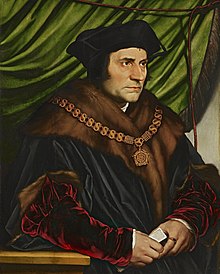Saint Thomas More
|
The Right Honourable Sir Thomas More |
|
|---|---|

Sir Thomas More,
by Hans Holbein the Younger, 1527 |
|
| Lord Chancellor | |
|
In office October 1529 – May 1532 |
|
| Monarch | Henry VIII |
| Preceded by | Thomas Wolsey |
| Succeeded by | Thomas Audley |
| Chancellor of the Duchy of Lancaster | |
|
In office 31 December 1525 – 3 November 1529 |
|
| Monarch | Henry VIII |
| Preceded by | Richard Wingfield |
| Succeeded by | William FitzWilliam |
| Speaker of the House of Commons | |
|
In office 16 April 1523 – 13 August 1523 |
|
| Monarch | Henry VIII |
| Preceded by | Thomas Nevill |
| Succeeded by | Thomas Audley |
| Personal details | |
| Born | 7 February 1478 London, England |
| Died | 6 July 1535 (aged 57) London, England |
| Resting place |
Church of St Peter ad Vincula, London, England 51°30′31″N 0°04′37″W / 51.508611°N 0.076944°W |
| Spouse(s) |
Jane Colt (m. 1505) Alice Harpur (m. 1511) |
| Children |
Margaret Elizabeth Cicely John |
| Alma mater |
University of Oxford Lincoln's Inn |
| Religion | Roman Catholic |
| Signature |  |
| Saint Thomas More, T.O.S.F. | |
|---|---|

Medallion of Thomas More
|
|
| Martyr | |
| Venerated in | Catholic Church; Church of England; some other churches of the Anglican Communion |
| Beatified | 29 December 1886, Florence, Kingdom of Italy, by Pope Leo XIII |
| Canonized | 19 May 1935, Vatican City, by Pope Pius XI |
| Feast | 22 June (Catholic Church) 6 July (Church of England) |
| Attributes | dressed in the robe of the Chancellor and wearing the Collar of Esses; axe |
| Patronage | Adopted children; civil servants; court clerks; difficult marriages; large families; lawyers, politicians, and statesmen; stepparents; widowers; Ateneo de Manila Law School; Diocese of Arlington; Diocese of Pensacola-Tallahassee; Kerala Catholic Youth Movement; University of Malta; University of Santo Tomas Faculty of Arts and Letters |
| Thomas More | |
|---|---|
| Notable work | Utopia (1516) |
| Era | English Renaissance |
| Region | Western philosophy |
| School | Renaissance Philosophy |
|
Main interests
|
Social philosophy |
|
Notable ideas
|
Utopia |
|
Influences
|
|
Sir Thomas More (/ˈmɔːr/; 7 February 1478 – 6 July 1535), venerated by Roman Catholics as Saint Thomas More, was an English lawyer, social philosopher, author, statesman and noted Renaissance humanist. He was also a councillor to Henry VIII, and Lord High Chancellor of England from October 1529 to 16 May 1532. He also wrote Utopia, published in 1516, about the political system of an imaginary ideal island nation.
More opposed the Protestant Reformation, in particular the theology of Martin Luther and William Tyndale. More also opposed the King's separation from the Catholic Church, refusing to acknowledge Henry as Supreme Head of the Church of England and the annulment of his marriage to Catherine of Aragon. After refusing to take the Oath of Supremacy, he was convicted of treason and beheaded. Of his execution, he was reported to have said: "I die the King's good servant, and God's first."
Pope Pius XI canonised More in 1935 as a martyr. Pope John Paul II in 2000 declared him the "heavenly Patron of Statesmen and Politicians." Since 1980, the Church of England has remembered More liturgically as a Reformation martyr. The Soviet Union honoured him for the Communist attitude toward property rights expressed in Utopia.
...
Wikipedia
